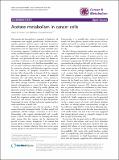Acetate metabolism in cancer cells
Author(s)
Hosios, Aaron M; Vander Heiden, Matthew G.
Downloads40170-014-0027-y.pdf (176.7Kb)
PUBLISHER_CC
Publisher with Creative Commons License
Creative Commons Attribution
Terms of use
Metadata
Show full item recordAbstract
Macromolecule biosynthesis is required to duplicate cell components and support proliferation. Studies examining the nutrients used by cancer cells have focused on the contribution of glucose and glutamine carbon for biosynthesis, but the importance of other metabolic fuels is becoming apparent. Labeling of two-carbon units in newly synthesized lipids has been used to infer the nutrients that contribute to the acetyl-CoA pools in cells. Glucose- and glutamine-derived carbon are known to contribute extensively to de novo lipid biosynthesis, and in this issue Kamphorst et al. find that extracellular acetate can also contribute substantially to this process [1].
Date issued
2014Department
Massachusetts Institute of Technology. Department of Biology; Koch Institute for Integrative Cancer Research at MITJournal
Cancer & Metabolism
Publisher
BioMed Central Ltd
Citation
Hosios, Aaron M. and Matthew G. Vander Heiden. "Acetate metabolism in cancer cells." Cancer & Metabolism 2014, 2:27.
Version: Final published version
ISSN
2049-3002